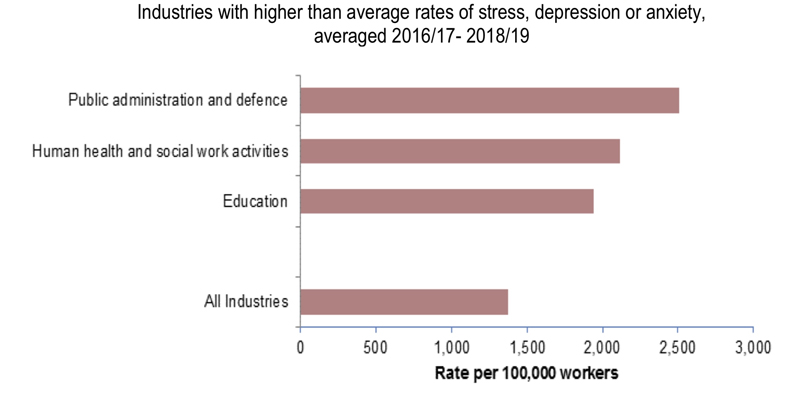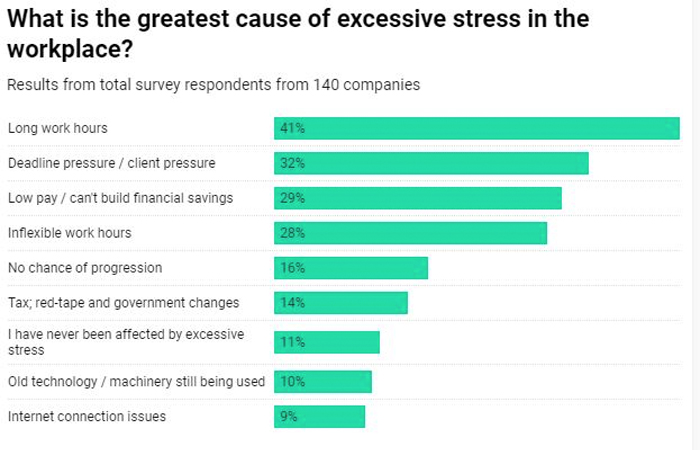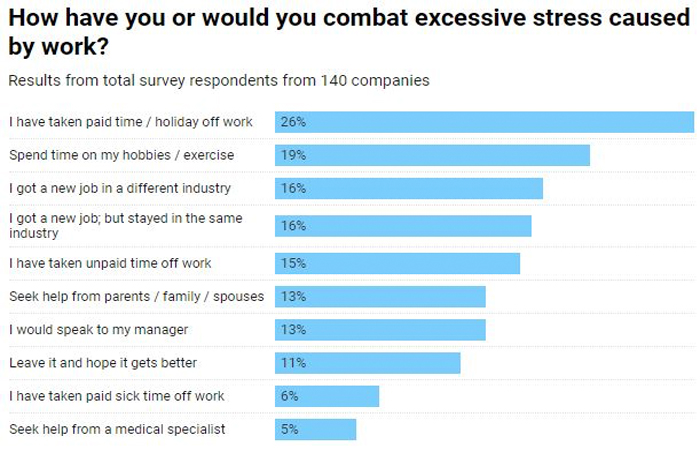Approximately 89% of UK employees have suffered from ‘excessive’ stress at work, according to the latest survey on workplace stress, carried out by Dolan Contractor Group.
Work-related stress is severely affecting staff mental health, resulting in 44% of work-related ill health and 54% of lost working days during 2018/19, confirmed HSE’s latest report Work-related stress, anxiety or depression statistics in Great Britain, 2019.
The release of both surveys coincide with International Stress Awareness Week taking place this week. HSE’s survey reveals that the UK’s health and public service sectors have the highest rates of work-related stress, depression or anxiety. In fact, healthcare workers, teachers and public service professionals experience higher levels of stress, compared to other job groups.

STRESS FACTORS
The main work-related stress factors cited by the HSE survey are workload pressures, such as tight deadlines and too much responsibility. Other factors include lack of managerial support, organisational changes at work, violence and lack of clarity around their job. Females (aged 25-54) had significantly higher rates of work-related stress, depression and anxiety compared with the overall average for all workers.
According to the HSE survey, smaller workplaces had a ‘significantly lower rate of work-related stress, depression or anxiety’ compared to the ‘higher rates’ reported by large workplaces.
The Dolan Contractor Group’s report provides more detail on the causes of excessive workplace stress. “The Stress in the Workplace study deepens our understanding of our contractors, freelancers and the self employed. It outlines the key areas that cause stress, and so gives us and employers insight to help reduce stress in the workplace,” explained Dolan Contractor Group’s Operations Director, Lauren Monks.
SURVEY FINDINGS
The Dolan Contractor Group study identifies differences in how stress is experienced between genders and between employees of SMEs and large companies, and reveals crucial differences between the support available to permanent employees, compared to what is offered to contractors/freelancers. It also reiterates HSE’s findings, highlighting that greatest cause of work-related stress in the UK for all workers (permanent and contractors/freelancer) are long working hours (41%), followed by deadline or client pressure (32%).

Approximately 41% of permanent female employees cite long working hours as the main reason for their excessive stress, compared to 39% of female freelancers/contractors. For 2 in every 5 permanent male employees, however, the greatest cause of excessive stress came from ‘no chance of progression in their job role’. This number halves for female staff.
STRESS COPING MECHANISMS
So how are employees coping with the ‘excessive pressures of work-related stress, and is there enough workplace support? When respondents were asked how they tackle stress, 30% of those working for large companies stated that they ‘would speak to their manager’. This figure, however, drops sharply to 12% of staff working at SMEs. This could explain why ‘significantly lower rates of work-related stress, depression or anxiety’ are reported at SMEs, as reported in the HSE study.
Over a quarter of permanent workers (26%) rely on their paid holiday time to combat stress, and around 1 in 8 employees have taken paid sick time off from work, reveals the study. Worryingly, only 1 in 20 said they would seek help from a medical specialist if they were suffering from excessive stress, with 1 in every 10 leaving it, in the hope they just ‘get better’. However, 16% of staff said they would leave their company if they weren’t given support for excessive workplace stress.

Given that around a quarter of employees surveyed left their job because of workplace stress (11% moved to a new job in the same industry and 14% left the industry altogether), the Dolan Contractor Group recommends that employers prioritise the issue to prevent loss of valuable staff.
STRESS-BUSTING STRATEGIES
Commenting on the study, Richard Holmes, Director of Wellbeing at Westfield Health, stated: “Burnout is a state of emotional, physical and mental exhaustion caused by excessive and prolonged stress. Pressure at work is usually the main culprit, and when budgets are tight and teams are small, people often find themselves with multiple roles and heavy workloads, piling on the stress.”
Policies like “flexible or remote working can help employees balance work and home life, and things like turning off email servers outside of working hours helps ring fence valuable recovery time,” he added. “Mental health first aid training can also help managers spot the signs or triggers and put preventions in place. Contractors or freelancers who don’t have the support of HR might need to adopt their own strategies, such as setting working hours, turning off email alerts out of these hours and separating work and living space if working from home.”
Some strategies to reduce workplace stress suggested by Dolan Contractor Group, include:
- Encourage flexible hours.
- Allow remote working.
- Give employees exercise incentives.
- Ensure managers lead by example, taking breaks and holiday.
- Offer wellbeing programmes.
- Organise social events.
- Work to improve communication so staff feel able to talk about problems.
For more information, on the Dolan Contractor Group’s workplace stress report and recommendations, click here.




































